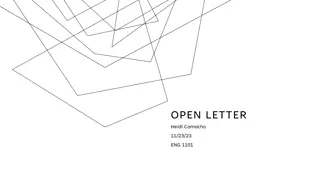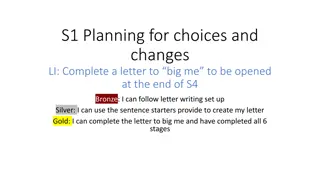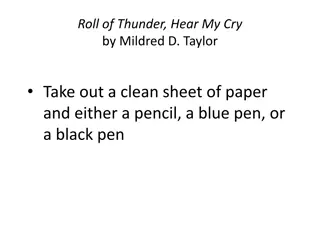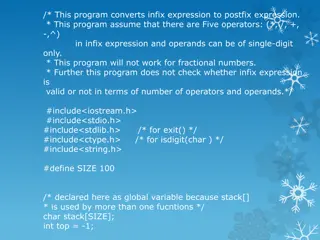Writing an Open Letter: A Powerful Form of Expression
Open letters are a compelling way to reach a wide audience, defend oneself, express strong views, or make appeals. Through examples like Siegfried Sassoon's impactful letter in 1917, the format and purpose of open letters become clearer. This form of communication allows for direct engagement with individuals or groups while also sharing perspectives with the public. Understanding the format, content, and audience of an open letter can help in conveying messages effectively and potentially prompting action.
Download Presentation

Please find below an Image/Link to download the presentation.
The content on the website is provided AS IS for your information and personal use only. It may not be sold, licensed, or shared on other websites without obtaining consent from the author. Download presentation by click this link. If you encounter any issues during the download, it is possible that the publisher has removed the file from their server.
E N D
Presentation Transcript
Writing An Open Letter www.aoifesnotes.com
Why write an open letter? To reach a wide audience To defend oneself, express a strong view or make an appeal Open letters are often aimed at an individual or group but are intended to be shared with the public
Sample Open Letter The next slide contains the text of an open letter written by Siegfried Sassoon in July 1917 It was distributed widely, read in the House of Commons and printed in the London Times
Lt. Siegfried Sassoon 3rd Batt: Royal Welsh Fusiliers I am making this statement as an act of wilful defiance of military authority because I believe that the war is being deliberately prolonged by those with the power to end it. I am a soldier, convinced that I am acting on behalf of soldiers. I believe that the war upon which I entered as a war of defence and liberation has now become a war of agression and conquest. I believe that the purposes for which I and my fellow soldiers entered upon this war should have been so clearly stated as to have made it impossible to change them and that had this been done the objects which actuated us would now be attainable by negotiation. I have seen and endured the sufferings of the troops and I can no longer be a party to prolong these sufferings for ends which I believe to be evil and unjust. I am not protesting against the conduct of the war, but against the political errors and insincerities for which the fighting men are being sacrificed. On behalf of those who are suffering now, I make this protest against the deception which is being practised upon them; also I believe it may help to destroy the callous complacency with which the majority of those at home regard the continuance of agonies which they do not share and which they have not enough imagination to realise.
Format of an Open Letter The name of the author and the date usually appear at the top of the letter, as in Sassoon s example. However, there is no hard and fast rule and if you prefer to sign off at the end, you may do so. There is no need for the sender/recipient s address If you wish to address your open letter to an individual or a group, do so. You can do this by giving your open letter a title: An open letter to all those who offer unwanted advice Provide a brief introduction outlining the reason or reasons you felt you had to write the letter Your points should be logically organised Be coherent and precise throughout Your conclusion should be related to the point you made at the outset and should, ideally, include some sort of call to action
Four Questions You Should Ask Yourself What is the task? - In this case, it is quite clear: an open letter What should the content be? - This will be determined by the question Who is my audience? - The public What sort of language should I use? - Formal, language of argument and/or persuasion
Pitfalls Attacking the reader or the subject of the letter in an inappropriately aggressive manner: you can of course criticize, but your tone should be reasonable and rational Providing unnecessary information or going off topic Structuring your letter poorly Failing to make it clear what you hope to achieve by writing this letter























